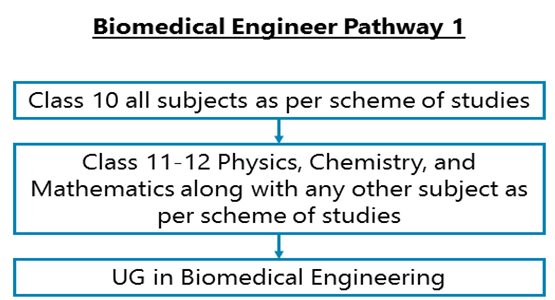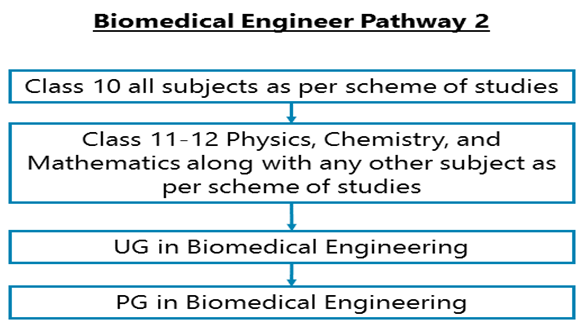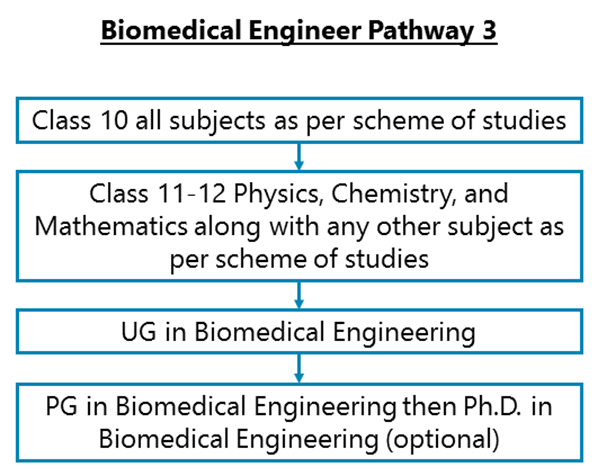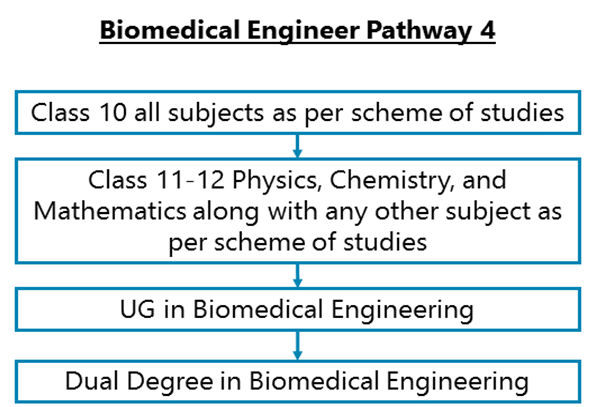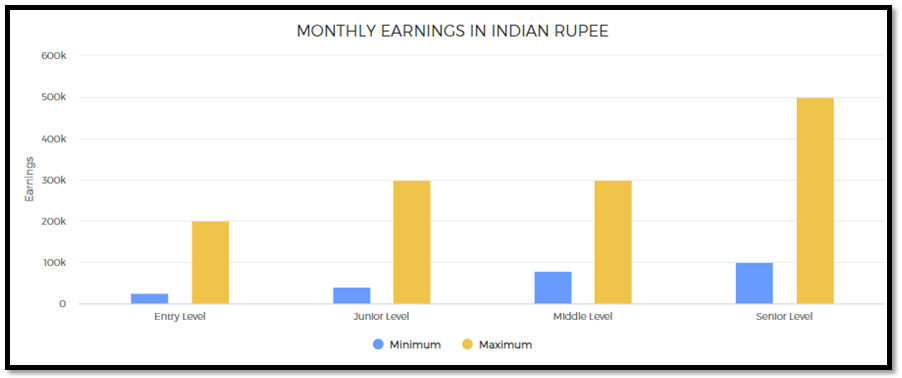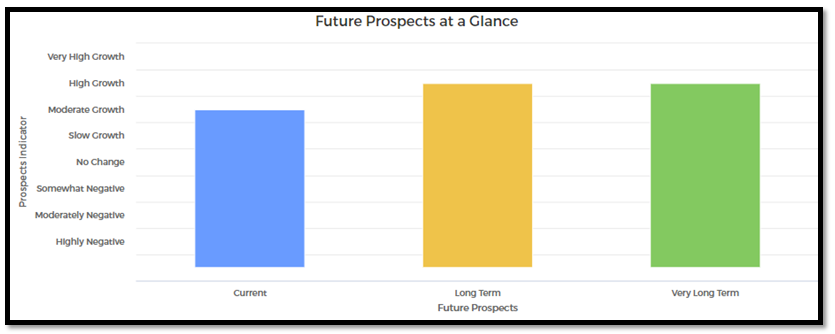Biomedical Engineer
Entry Level Qualification
12
Career Fields
Engineering & Technology
For Specially Abled




Career Entrance Exam
JEE MAIN BE/BTECH, JEE ADVANCED, BITSAT UG, MHTCET, WBJEE, KEAM
About Career
PARTICULARS | DESCRIPTION |
Name | Biomedical Engineer |
Purpose | Develop New Devices And Equipment |
Career Field | Engineering & Technology |
Required Entrance Exam | JEE MAIN BE/BTECH, JEE ADVANCED, BITSAT UG, MHTCET, WBJEE, KEAM |
Average Salary | 300000 - 2000000 Rs. Per Year |
Companies For You | Apollo Hospital, Max Hospital, Biocon & Many More |
Who is Eligible | Class 12th Pass |
Biomedical Engineers are specialist engineers who apply the knowledge of engineering and design concepts in the field of medicine for healthcare. As a biomedical engineer, you will use the design and problem-solving skills to design health care treatment and health monitoring equipment (for diagnosis, health monitoring and therapy). As a biomedical engineer, you will also manage the current medical equipment within hospitals while adhering to the industry standards. As a medical engineer, you will be responsible for procurement, testing, maintenance, disposal, decommissioning, purchasing of medical equipment. You will develop several medical devices from micro implants to clinical equipment including MRI machines, regenerative tissues growths, imaging technology equipment, pharmaceutical drugs, etc.
Key roles and responsibilities
As a Biomedical Engineer, depending on your field of specialisation, you would have the following roles and responsibilities:
1. You will design and develop different types of medical diagnostic equipment and procedures, and clinical instrumentation with the help of principles of engineering.
2. You will conduct research about the engineering aspect of the biological systems of humans and animals along with life scientist, medical scientists, pharmacologists, etc.
3. You will manage a team of engineers. You will create their schedules, you will track inventory, create a budget, utilize budget as per the plan, oversee contracts and obligations. You will work within the deadline.
4. You will design computer hardware and software for the purpose of medical science.
5. You will evaluate safety, efficiency and effectiveness of medical equipment that you manufacture or produce.
6. You will design several biomedical equipment and devices including artificial internal organs, body parts replacements, diagnosing machines, etc.
7. You shall be responsible for the installation, adjustment, maintenance, repairmen and for providing any technical assistance and support for biomedical equipment.
8. You will train technicians and other medical personals on how to properly use biomedical equipment.
9. You will prepare procedures and then write technical reports. You will also publish your reports and research paper and make a recommendation based on your research.
10. You will present scientific findings with other scientists, medical experts, pharmacologists, clinicians, hospitals, government, engineers, and public.
Career Entry Pathway
Class 10 all subjects as per scheme of studies – Class 11-12 Physics, Chemistry, Mathematics along with any other subject as per scheme of studies – UG in Biomedical Engineering
After Class 11-12 Physics, Chemistry, Mathematics along with any other subject as per scheme of studies in your higher secondary school and then study for an undergraduate degree in Biomedical Engineering.
Class 10 all subjects as per scheme of studies – Class 11-12 Physics, Chemistry, Mathematics along with any other subject as per scheme of studies – UG in Biomedical Engineering – PG in Biomedical Engineering
After Class 11-12 Physics, Chemistry, Mathematics along with any other subject as per scheme of studies in your higher secondary school and then study for an undergraduate degree in Biomedical Engineering followed by a master’s degree in Biomedical Engineering.
Class 10 all subjects as per scheme of studies – Class 11-12 Physics, Chemistry, Mathematics along with any other subject as per scheme of studies – UG in Biomedical Engineering – PG in Biomedical Engineering – Ph.D. in Biomedical Engineering
After Class 11-12 Physics, Chemistry, Mathematics along with any other subject as per scheme of studies in your higher secondary school and then study for an undergraduate degree in Biomedical Engineering followed by a post-graduate degree in Biomedical Engineering. Further, you can take Biomedical Engineering in Ph.D. and complete the doctoral degree.
Class 10 all subjects as per scheme of studies – Class 11-12 Physics, Chemistry, Mathematics along with any other subject as per scheme of studies – UG in Biomedical Engineering – Dual Degree in Biomedical Engineering
After Class 11-12 Physics, Chemistry, Mathematics along with any other subject as per scheme of studies in your higher secondary school and then study for a undergraduate degree in Biomedical Engineering. Further, you can study dual degree in Biomedical Engineering and complete the doctoral degree.
Required Qualification & Competencies
To become a Biomedical Engineer, you may either do a bachelor’s degree in Biomedical Engineering / Medical Engineering / Biological Engineering/ Electronics Engineering / in a similar field. You may opt to do a Master’s degree in Biomedical Engineering / Medical Engineering after your bachelor’s degree
MINIMUM EDUCATION REQUIRED | MAXIMUM EDUCATION REQUIRED |
Under Graduate | Doctoral |
COMPETENCIES REQUIRED
Interests
1. Investigative: You should have interests for Investigative Occupations. Investigative occupations involve working with ideas and quite a lot of thinking, often abstract or conceptual thinking. These involve learning about facts and figures; involve use of data analysis, assessment of situations, decision making and problem-solving.
2. Realistic: You should have interests for Realistic Occupations. Realistic occupations involve more practical and hands-on activities than paperwork or office work. Realistic occupations often involve physical activities for getting things done using various tools and equipment.
Abilities
1. Abstract Reasoning: The ability to understand ideas which are not expressed in words or numbers; the ability to understand concepts which are not clearly expressed verbally or otherwise.
2. Deductive Reasoning: The ability to apply general rules and common logic to specific problems to produce answers that are logical and make sense. For example, understanding the reasons behind an event or a situation using general rules and common logic.
3. Flexibility of Closure: The ability to identify or detect a pattern (a figure, object, word, or sound) that is hidden among other distracting materials.
4. Inductive Reasoning: The ability to combine pieces of information from various sources, concepts, and theories to form general rules or conclusions. For example, analysing various events or situations to come out with a set of rules or conclusions.
5. Inter-Personal: The ability to build and maintain good relationships with others at workplaces and elsewhere.
6. Naturalistic Intelligence: The ability to recognise different flora and fauna of the world; sensitivity towards nature and natural surrounding; sensitivity towards the needs of different flora and fauna.
7. Numerical Reasoning: The ability to add, subtract, multiply, divide, and perform other basic numerical calculations correctly.
8. Originality: The ability to come up with unusual or innovative ideas about a given topic or situation, or to develop creative ways to solve a problem.
9. Spatial Ability: The ability to visualise three dimensional objects by looking at the objects in paper or visualise objects mentally in three dimensions.
10. Verbal Reasoning: The ability to think and reason with words; the ability to reason out ideas expressed in words.
11. Written Comprehension: The ability to read and understand information and ideas presented in writing.
Knowledge
1. Biological Sciences: Knowledge of plants and animals, their anatomical structure, cell structure, tissues, physiological functions, evolution, and all other related aspects.
2. Chemical Science: Knowledge of the chemical composition, structure, and properties of substances and of the chemical processes and transformations that they undergo. This includes uses of chemicals and their interactions, toxicity, production techniques, and disposal methods.
3. Engineering and Technology: Knowledge of various applications of one or more branches of Engineering Science & Technology to manufacture and produce various goods or construct or erect various structures. This include knowledge about design, development, prototype testing, manufacturing, construction, installation, repair and maintenance.
4. Physical Science: Knowledge of physical principles, laws, their interrelationships, and applications to understand fluid, material, earth, ocean, atmosphere, and space dynamics, as well as mechanical, electrical, atomic and sub- atomic structures, properties and processes.
5. Technical and Engineering Design: Knowledge of various techniques, methods, specifications and tools for creating, developing and laying out designs of various machines, equipment, devices, manufacturing plants, structures, systems and processes. This includes developing blueprints, drawing and models.
Skills
1. Active Learning: Focused and continuous learning from various sources of information, observation and otherwise for application in getting work done.
2. Coordination: Skills in working together with other people to get things done.
3. Critical Thinking: Skills in analysis of complex situations, using of logic and reasoning to understand the situations and take appropriate actions or make interpretations and inferences.
4. Judgment and Decision Making: Skills in considering pros and cons of various decision alternatives; considering costs and benefits; taking appropriate and suitable decisions.
5. Operations and Process Analysis: Skills in analysis of operations and processes such as industrial manufacturing, chemical processing, etc. so as to device better and more efficient operational processes and systems.
6. Problem Solving: Skills in analysis and understanding of problems, evaluating various options to solve the problems and using the best option to solve the problems.
7. Process and Operation Controlling: Skills in controlling processes and operations of various machines, equipment, devices and systems using different types electrical and electronic control instruments and systems.
8. Quality Control Analysis: Skills in conducting tests and inspections of products, services, or processes to evaluate quality or performance.
9. Reading Comprehension: Skills in understanding written sentences and paragraphs in work related documents.
10. Scientific: Skills in using various scientific rules and methods to get things done or solve problems.
11. Technical: Skills in using various technologies and technical methods to get things done or solve problems.
12. Technical Design and Drawing: Skills in creating and developing designs and drawings for various structures, machines, equipment, and devices.
Personality
1. You are always or mostly organised in your day-to-day life and activities.
2. You are a soft-hearted person sometimes.
3. You trust others sometimes but not always.
4. You are helpful to others sometimes.
5. You prefer to experience new things and have new experiences sometimes.
6. You act independently sometimes but do not do so in some other times.
Career - Job Opportunities & Profiles
1. If you are into production, then you may join as a production engineer trainee/ biomedical engineer.
2. If you are into sales, then you may join as an assistant sales manager/ sales representative.
3. If you are into teaching, then you may join college or university at the profile of an assistant professor.
4. If you are into research, then you can join a research institute at the role of research associate and pharmaceutical companies as a research engineer.
5. Some of you may also join as a service engineer.
6. If you are into scientific research, then you can join as a Scientist with Grade “C”.
Different types of companies can offer you a job. Such as:
1. Leading biomedical instruments and equipment manufacturing companies like Biocon.
2. Biomedical artificial body parts, stents, etc. manufacturing firms.
3. Government Hospitals like AIIMS.
4. Private Hospitals and Clinics like Apollo Hospital, Max Hospital, etc.
5. Biomedical Engineering department of all IITs and Engineering colleges.
Work Environment
As a Biomedical Engineer, you would mostly work in the biomedical manufacturing sector. The manufacturing sector is may or may not be labour intensive but it is very sensitive and needs the highest level of precaution. Thus, you need to work on the ground with uttermost care while coordinating with other engineers and scientist. If you are into scientific research or working in a scientific institute, you will work in an intensive environment with work related to developing new machines, new body replacement parts.
SPECIALISATION TRACKS IN THIS CAREER
1. Bioinstrumentation Engineer
Bioinstrumentation Engineer is a specialist who plans, designs and produces devices and mechanics used to measure, evaluate and treat biological systems. These set of equipment includes MRI machines, imaging technology equipment, fitness trackers, optical instrument, lenses, glasses, etc.
2. Biomaterial Engineer
A biomaterial engineer is a specialist who plans, designs and manufactures biomaterial including artificial internal organs, body parts replacements, artificial tissues, stents, contact lenses, breast implants, bone cement, etc.
3. Clinical Engineer
The clinical engineer is a healthcare technology specialist who manages biomedical technology and equipment at the clinic or hospital. They supervise the team of technicians and train them on how to use the equipment. Some of the clinical engineers also work with hospitals as technology consultants.
CAREER GROWTH
1. If you are into production and joined as a production engineer trainee. Soon, you would become a production engineer. You may be then promoted to production manager (Manufacturing) and then plant manager (manufacturing).
2. The career growth in university and college states from Assistant Professor and then Associate Professor, Professor and Professor Emeritus. Professors can also get administrative positions such as Director/Dean/Vice Chancellor, etc
3. Research laboratories will hire you as a scientist/scientist officer with the lowest grade and the grade changes from low to high. In India, grades are “Scientist “C” as the joining level and then D, E, F, G, H, etc. A senior-level scientist can also get into administrative positions like Principal Scientist, Assistant Director, Deputy Director, Director, etc
4. If you start a career as a sales representative or sales manager, then you may become a senior sales manager and thenan area sales manager and then regional sales manager. Some of you may even become VP of Sales.
Salary Offered
1. At the entry level, as a Scientist (grade C) or Research engineer, you would be earning around Rs. 80,000 to 100,000 per month. As an assistant professor, you would be earning anything between Rs. 65,000 to 70,000 per month. As a production engineer, you would be earning anything between Rs. 20,000 to 2,00,000 per month. As a sales representative, you might be earning Rs. 25,000 to 100,000 per month. As a service engineer, you might be earning around Rs. 10,000 to 100,000 per month.
2. At the junior level with a work experience of 2-6 years, you would be earning anything between Rs. 40,000 to 3,00,000 per month.
3. At the middle level with an experience of 10-12 years, you would be earning anything between Rs. 1,40,000 to 1,90,000 per month as a scientist and Rs. 1,20,000 to 1,60,000 as a professor and as a production engineer, service engineer, etc. Rs. 80,000 to 4,00,000 per month. As a sales manager, you might earn around Rs. 60,000 to 3,00,000 per month.
4. At the senior level of over 15 years of work experience, you would be earning anything between Rs. 1,60,000 to 2,00,000 per month as a professor and Rs. 2,10,000 to 2,50,000 per month as a Scientist or research engineer. As a production engineer or service engineer, you would be earning anything between Rs. 1,00,000 to 5,00,000 per month.
MONTHLY EARNINGS IN INDIAN RUPEE
1. Entry level: 0 - 2 years of work experience
2. Junior Level: From 1 to 12 years of work experience
3. Mid Level: From 5 to 20+ years of work experience
4. Senior Level: From 10 to 25+ years of work experience (there could be exceptions in some high-end technical, financial, engineering, creative, management, sports, and other careers; also in the near future, people will reach these levels much faster in many careers and in some careers, these levels will have no meaning as those careers will be completely tech skill driven such as even now, there is almost no level in a Cyber Security Expert’s job).
Work Activities
1. Analysing and interpreting data and information: Analysis of data and information to find facts, trends, reasons behind situations, etc.; interpretation of data to aid in decision making.
2. Communicating with co-workers and others: Communicating with people in writing, verbally or otherwise inside your workplace and various other people who have professional relationships with your place of work including vendors, government officials, etc. or with people at large.
3. Decision making and problem solving: Analysis of data and information; evaluation of alternative decisions and results of decisions; taking the right decisions and solving problems.
4. Getting Information and learning: Observing, hearing, reading, using computers, or otherwise obtaining information and learning from it.
5. Inspecting equipment, systems, structures, and materials: Inspecting equipment, systems, structures, and materials to ascertain quality, performance, defects, causes of errors, etc.
6. Inspecting situations, events, and people: Inspecting situations, events and people to understand the reasons and causes for the situation or events to happen; inspecting people to understand reasons behind their behaviour and actions.
7. Organising, planning and prioritising tasks: Planning and organising tasks in order to achieve work goals; prioritising tasks to achieve goals and making the best use of the time available.
8. Updating and using relevant knowledge: Keeping updated with the latest knowledge relevant to your fields of work and use of the relevant knowledge in getting things done.
9. Using computers for work: Using computers for day-to-day office work; using computer software for various applications in day-to-day professional work; entering data and process information; for writing.
10. Working in a team: Working in a team of people; developing team; maintaining professional relationships among team members.
Future Prospects
The Indian biomedical or medical device industry size was USD 5.2 billion in 2017. It is expected to grow to USD 50 billion in 2025 at a rate of 28% per annum. That will be 10 times increment in 8 years. Around 86% of the devices are exported from India. Thus, even export plays a big role in this industry. Within the field, Orthopaedic prosthetics and patient aids segments are the fastest growing with over 9.6% and 8.8% per annum respectively. With such a high rate of increment and excellent export record, the industry will offer many new jobs in the field.
FUTURE PROSPECTS AT A GLANCE


